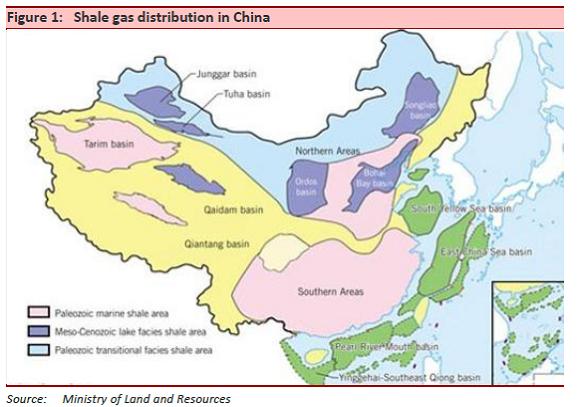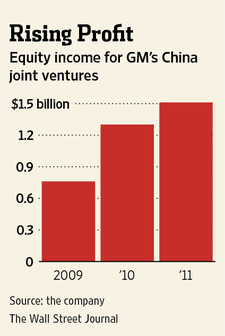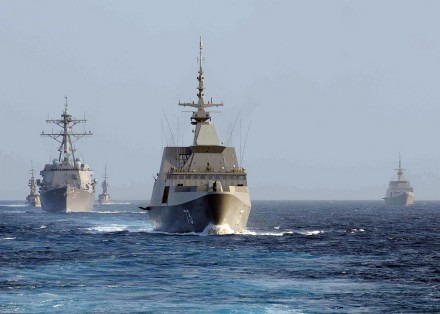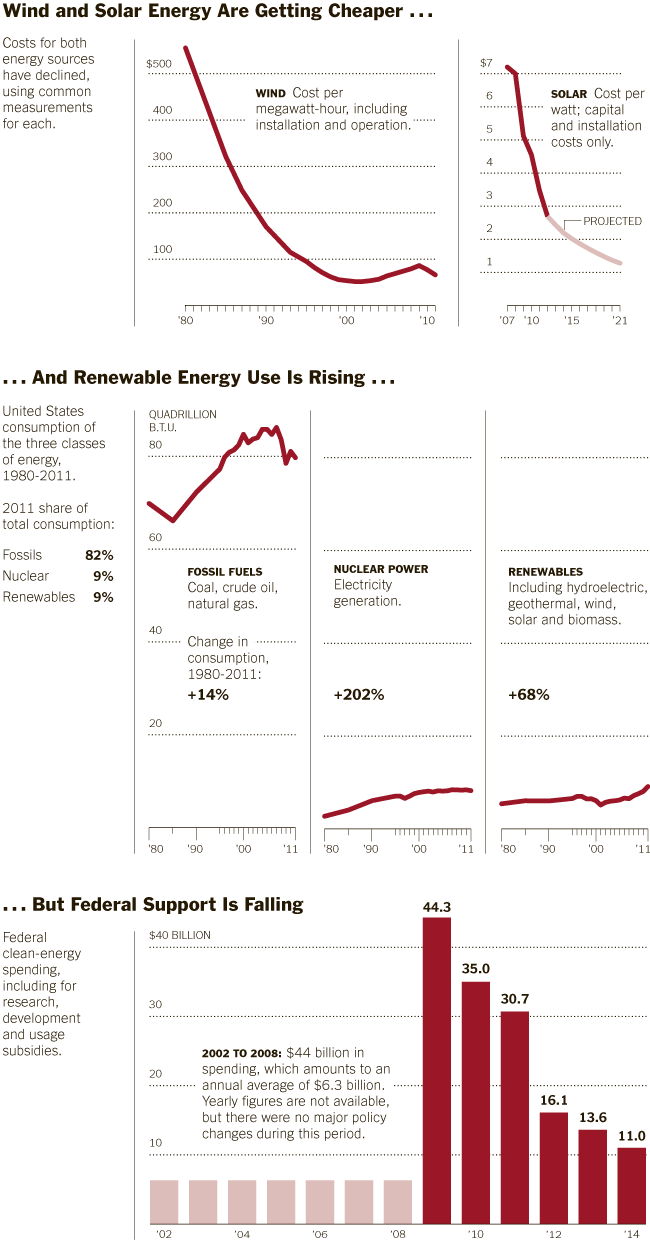Written by an Aussie strategist for The Diplomat.
Here is the best chunk. I italicize the parts I found most compelling.
By denying China’s capacity for anti-access, the United States intends to preserve its options for sea-control and power projection, reinforcing its primacy and role as the region’s guarantor of free navigation. This decision, in turn, reflects a deeper, more quixotic judgement that such an objective is both vital to the United States and attainable at a level of cost and risk commensurate with US interests in the region.
On both counts, though, there are reasons to be sceptical. First, the cost of AirSea Battle is likely to be prohibitive. Though it remains a largely notional concept, AirSea Battle will depend on an expansive set of upgraded capabilities: a hardened and more dispersed network of bases and C4ISR systems; more and better submarine, anti-submarine and mine-warfare capabilities; and new, long range conventional strike systems, including bombers and anti-satellite weapons. Then, of course, there are the aircraft carriers and other major surface combatants, strike-fighter aircraft, and possibly even amphibious ships.
This strategy is no panacea for the region’s problems, of course. It wouldn’t be cheap or easy and it would involve Washington making some hard capability trade-offs as well as accepting greater limits on its capacity for intervention in the Western Pacific. But there are benefits as well. In particular, maritime denial would allow the US to continue to play a strong role in the region. It would enable Washington to fulfil its defensive commitments to regional allies, prevent Chinese dominance and, at the same time, by reducing its visible military footprint, give Beijing more political breathing room. To that end, a US maritime denial strategy would also help avoid the worst aspects of crisis instability that AirSea Battle would provoke. And all without breaking the bank.
Needless to say, these are expensive capabilities. Many are disproportionately costly (and vulnerable) relative to the platforms against which they’re being fielded. And in some cases, particularly anti-submarine warfare and ballistic missile defence, their prospective cost greatly exceeds the operational effect they can be expected to produce. All of this would be exacting for the United States in peak economic condition. In a new era of fiscal stringency, with US debt expanding and the Pentagon looking to save hundreds of billions over the next decade, expecting the US military to do more with less is at best unlikely, and at worst wholly untenable.
It also risks failing to learn from history. Strategic competition in the Western Pacific is beginning to echo the Cold War, only this time the United States is at risk of reprising the role of the Soviet Union. Washington has already repeated Moscow’s mistakes in Afghanistan. With AirSea Battle, Washington is trying to do too much with too little. It’s facing off against an opponent in better economic shape whose smarter, more asymmetric strategy will impose a disproportionate military burden. For Washington, adopting such a maximalist doctrine risks playing into China’s hands and, like the Soviet Union, spending itself into penury.
But cost factors are only part of the danger. An arms race is already underway in Asia. AirSea Battle will accelerate this process, with serious implications for regional stability and crisis management. First, by creating the need for a continued visible presence and more intrusive forms of surveillance in the Western Pacific, AirSea Battle will greatly increase the range of circumstances for maritime brinkmanship and dangerous naval incidents.
Second, AirSea Battle’s emphasis on pre-empting China by striking early against the PLA will continue to compress the time available to decision-makers in a crisis. As military plans become increasingly dependent on speed and escalation, and diplomacy fails to keep up, a dangerous ‘use it or lose it’ mentality is likely to take hold in the minds of military commanders. This risks building an automatic escalator to war into each crisis before diplomatic efforts at defusing the situation can get underway.
And finally, AirSea Battle calls for deep strikes on the Chinese mainland to blind and suppress PLA surveillance systems and degrade its long-range strike capabilities. Such an attack, even if it relied solely on conventional systems, could easily be misconstrued in Beijing as an attempt at pre-emptively destroying China’s retaliatory nuclear options. Under intense pressure, it would be hard to limit a dramatic escalation of such a conflict – including, in the worst case, up to and beyond the nuclear threshold.
Taken together, the costs and risks associated with AirSea Battle spell trouble for US primacy in Asia, and for the sea control and power projection capabilities on which it relies. Yet while Washington’s comfortable hegemonic habits will be hard to kick – especially after so many peaceful, prosperous decades – it’s not all doom and gloom. Primacy, after all, is only a means to an end, a way of preventing China from attaining regional dominance. There are other, more cost effective ways of doing that, including by playing China at its own game. That would involve developing a maritime denial strategy, focused mainly on the use of submarines, designed to inhibit China’s use of the sea for its own power projection. Indeed, the same capabilities that imperil US power projection in the Western Pacific would have an equally profound effect on China’s own fledgling efforts.
A very smart analysis of the dangers and costs. And the "out" provided by focusing more on subs would make even me a serious believer of increasing our capacity there versus CSBA's somewhat insane notion of bombing the breadth and length of China and somehow not triggering a nuclear escalation.
People are going to construe being against the CSBA's notion of AirSea Battle as capitulating to Chinese domination of East Asia. That is, of course, complete nonsense.
Proponents of ASBC will also toss in the if-you-only-know-the-secret-stuff-I-know-you'd-buy-into-ASBC card. That secrecy argument is the equivalent of patriotism-as-the-last-refuge-of-scoundrels temptation - as in, when you can't win the argument on cost and feasibility and dangers and operational success, then simply hide behind the "ominous" signs that only you and yours are privy to.
There are, as this article points out, cheaper and more sensible alternatives. To those provided here, I would simply add selling plenty of military capabilities to the rest of East Asia (which we're already doing).
As I said before, ASBC suffers greatly from aspiring to be an Air Force-Navy Full Deployment Act. Like any force structure wish list, it must ramp up the storylines - hence the fantastic war-gaming of CSBA that is intellectually fradulent to the point of being laughable.
There is no strategic logic that says the US should get in an absurdly expensive spending war with China over a scenario that happens just outside China's front door. There is also no logic in promising a hair-trigger standoff where we pre-emptively bomb the length and breadth of China just to get them to back off from some aggressive shenanigans in their neighborhood. For America, already deeply intertwinned with China on trade and investment and debt, to adopt such a posture is simply ludicrous. These notions remain the fantasy of strategists who live "inside baseball" lives and have little to no clue about how this larger world works. "Strangelovian" is not too strong a term. In fact, it's right on the mark, because it implies a closeted world of strategists with no sense of proportion or connection to the wider dynamics of power in this era. This is dinosaur thinking at its worst, and it needs to be opposed whenever and wherever possible.
Keeping China from doing something truly stupid in East Asia is not hard. We need to undermine their asymmetrical approach by - as this article argue - creating our own, and NOT by setting ourselves up for a rapidly escalating great-power war. Bombing the length and breadth of China in the opening hours of some crisis is just plain stupid and reckless and painfully unimaginative. This is a massive retaliation response that pretends China isn't a nuclear power capable of significant retaliation.
Sometimes I feel like I'm the only person who hasn't taken the crazy pill on this one: YOU DON'T CONDUCT WIDESPREAD BOMBING CAMPAIGNS AGAINST THE HOMELANDS OF NUCLEAR POWERS!
There is no clever way to spin ASBC's logic. It promises a sheer - and therefore reckless - overkill that defies any sensible strategic logic.
This is not a "revolution in military affairs." This is Cold War thinking at its most rigid - somehow surviving within our ranks. It pretends, in the classic domino thinking approach, that if China pulls off anything in East Asia, we will have lost the entire competition!
Again, can you get any more narrow in your reading of the entirety of our world or our capacity to lead globally versus that of China's? That's were ASBC truly sucks: it reduces all our enduring strengths to one specific threat and then asks us to roll the dice on nuclear war over that one scenario. Why? BECAUSE IF WE DON'T ALL WILL BE LOST AND CHINA WILL RULE THE WORLD!
Honestly, doesn't that logic strike you as cartoonishly bad? Remember when the Commies won everything by grabbing South Vietnam? Or does it seem strange that we're now allying with Vietnam against China?
The "primacy" impulse dies hard within our ranks, especially among those who imagine that it resides solely with our military means to wage war. The naive simplicity of this argument is almost beneath serious debate for anyone not trapped in the Pentagon's self-serving notions of "power!" (meaning 99.9% of the world as we know it).
But this is, sad to say, all part and parcel of the politics of protecting one's budget, so get used to hearing all sorts of bad strategic logic tossed in your faces. In virtually every instance, the goal will be the same: to scare you into accepting the mis-allocation of resources within the US defense budget.
We live in a world of small wars. That is the reality of the world America spent the last seven decades creating and defending.
But we are still far too dominated and influenced by an elite that sees the world only in big-war terms, because those capabilities are what that elite believes will continue to provide for American primacy.
Simply put, we created a world in which numerous great powers could rise, but some of us continue to freak out over that achievement.
I will readily confess: the more time I spend in international business, the less I find I have in common with the national security community in the United States. That whole mess strikes me today as being more divorced from reality than at any previous time in my career.
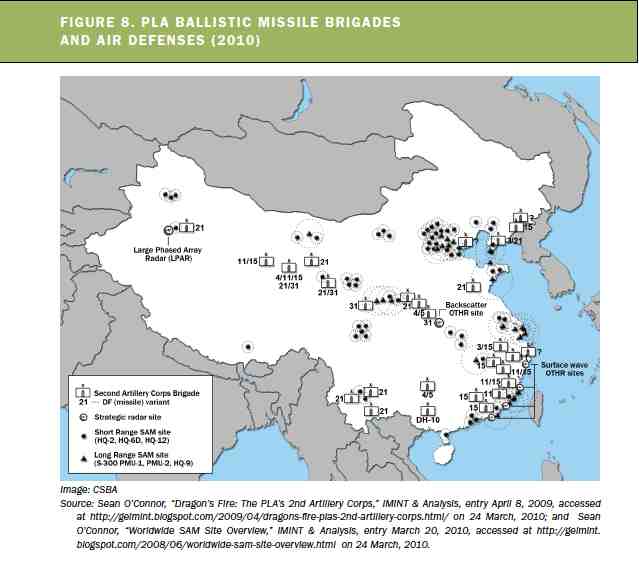
From the CSBA report on ASBC: the section entitled "Executing a Missile Suppression Campaign."
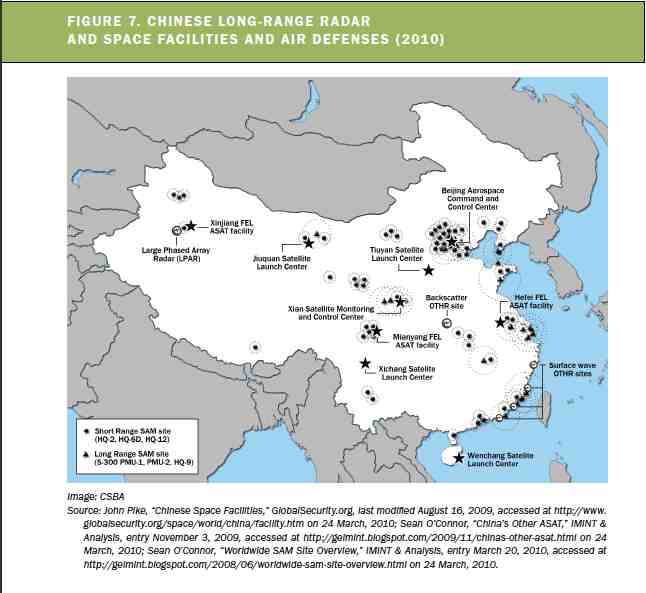
From the CSBA report on the ASBC: the section entitled "Blind PLA ISR Systems."
These two maps detail the places where CSBA advocates that the ASBC campaign should target in the opening salvos of any war with China.
Again, imagine the Chinese bombing on similar terms across the length and breadth of the continental US and then consider what our strategic response might be.
 Friday, September 21, 2012 at 12:03AM
Friday, September 21, 2012 at 12:03AM 